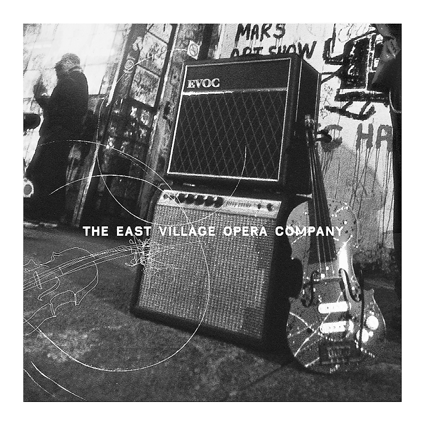Move over “Tommy,” East Village Opera brings a new wizard to town
Many opera fans would be horrified at the idea of having their beloved arias sullied by the addition of screaming electric guitars. And there are few rockers who, when asked to name a truly mind-blowing tune, would select a piece of classical music. Perhaps that is the reason why the music of the East Village Opera Company is so revolutionary. This 11-person group takes opera classics and, very respectfully, turns out majestic rock anthems.
Their new album, released this week by Universal Records/Decca, opens with the classic strains of the popular overture from “Le Nozze di Figaro.” The first few measures of the tune are classically performed, then the electric guitars enter, the drum rolls in, and the keyboards get to work. The call and response between the violins and electric guitars is pure synergy, ending in a screaming guitar riff.
This group, created by multi-instrumentalist Peter Kiesewalter and lead vocalist Tyley Ross, clearly respects the craftsmanship of the music they are working with. This allows their sound to be more than just a gimmick; in fact, it elevates a great piece of music even higher by adding new instruments, and at the same time brings it to the masses. Clearly it is opera, but just as clearly, it totally rocks.
Kiesewalter noted that when they were written, these songs were the music of the people. In a March 2004 article in The Washington Post, he was quoted going so far as to say, “There’s no doubt in my mind that these composers would be using all the tools we’re using if they were alive and writing these operas today.”
It helps that the songs the EVOC has chosen to cover are familiar. Their cover of “Nessun Dorma” is an easily recognizable tune that starts deep and mellow, with acoustic guitar and beautiful vocals, and grows in intensity, adding guitars until it merges into an almost pop music sound. And their cover of “La donna e mobile,” a song used in everything from cartoons to commercials for “I Can’t Believe It’s Not Butter” is definitely one for the masses. The violin intro reveals a purely classical arrangement—at least for about two quatrains, before pounding drums and electric guitar chime in. Then, it takes on a life of its own, still respectful of the tremendous power of the original arrangement, but with a definite “Arabian Nights” vibe and up tempo backbeat, with rapid-fire cymbals. The performers acknowledge the clear ties this rendition has with Queen’s “Bohemian Rhapsody,” and further that they also married this “Rigoletto” favorite to the 4/4 beat of Janet Jackson’s “Rhythm Nation.”
A favorite on this release, the two-year old EVOC’s second album, is “Flower Duet,” the classic story of Lakmé by the French composer Léo Clément Philibert Delibes. This is the tune that Catherine Deneuve’s character played for Susan Sarandon’s character in the seminal lesbian vampire cult hit, “The Hunger.” As Deneuve’s character told it, it is a story of a beautiful Indian princess, Lakmé, and her servant Mallika who travel down a river together in search of the blue lotus flower sacred to the god Ganesha. The EVOC turns out the most inspired version of this classic ever, with lilting vocals, rising and falling in pitch like a river, haunting and captivating.
The group evokes a pop sound in “Au fond du temple saint,” with a drumbeat that could just as easily back Bryan Adam’s hit, “The Summer of ’69.” The melding of voices of Ross and AnnMarie Milazzo is sublime and the keyboard work here is amazing.
But the unlikely award for the best of the bunch surely goes to “O mio babbino caro,” sung in Italian, but with a beat like Massive Attack, with haunting background vocals meshing in. Hand drums give it a very capricious, free feel. It begins super slow, but is relentless in its ability to captivate. A very modern sound is achieved with the addition of the lyrics in English, “Come to me break the curse you’ve invented, I can see with a kiss you’re tormented/ naked me, waiting here uncontented, got to have your love…. Outside it starts to rain, inside I go insane/ tonight in your arms again, mercy mercy mercy.” This is a complex, multi-layered arrangement, with violins merging with electronica and guitar in an elaborate dance that is simply breathtaking.
The only track that even comes close to rivaling this in its complexity is “Habanera,” which is as good as its name when it comes to delivering a hot-as-hell bite. This tune jumps into gear with fast, concise violins, both hand and kit drums working together, and pouncing, pounding rock. This is a fierce piece of music with a wonderful disco/calypso break, a bit of Spanish guitar, and a touch of Indian music. It moves in fits and starts, slowing down only to explode again. It is sung in French, with the English chorus, “Love is the woman that no one can tame.”
Several more conservative arrangements are found on the album, yet none is thoughtlessly produced, and all have a modern element—a screech of Patti Smith here, a bit of Pat Benatar there, a touch of Sade in the chorus. The final track, “E lucevan le stelle” plays like a theme song for a James Bond movie, meshed with Pink Floyd’s “Dark Side of the Moon” effects at the end.
The music of the East Village Opera Company may be “unapologetically grandiose,” as the mainstream media has noted, yet it is this self-serious treatment that allows for the seamless merging of the passion of opera and the pomposity of rock and roll. At first glance, opera meets rock may not seem like the most logical pairing, but as the crowds of hipsters and opera lovers who cram into Joe’s Pub for EVOC’s shows attest, opposites do indeed attract.
gaycitynews.com



































